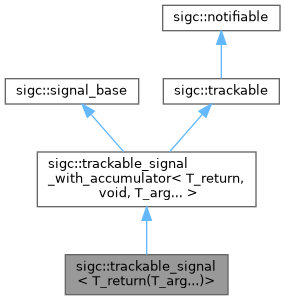trackable_signal can be used to connect() slots that are invoked during subsequent calls to emit(). More...
#include <sigc++/signal.h>

Classes | |
| class | accumulated |
| Like sigc::trackable_signal but the additional template parameter T_accumulator defines the accumulator type that should be used. More... | |
Public Types | |
| using | accumulator_type = void |
 Public Types inherited from sigc::trackable_signal_with_accumulator< T_return, void, T_arg... > Public Types inherited from sigc::trackable_signal_with_accumulator< T_return, void, T_arg... > | |
| using | slot_type = slot< T_return(T_arg...)> |
 Public Types inherited from sigc::signal_base Public Types inherited from sigc::signal_base | |
| using | size_type = std::size_t |
 Public Types inherited from sigc::trackable Public Types inherited from sigc::trackable | |
| using | func_destroy_notify = internal::func_destroy_notify |
 Public Types inherited from sigc::notifiable Public Types inherited from sigc::notifiable | |
| using | func_destroy_notify = internal::func_destroy_notify |
Additional Inherited Members | |
 Protected Types inherited from sigc::signal_base Protected Types inherited from sigc::signal_base | |
| using | iterator_type = internal::signal_impl::iterator_type |
 Protected Member Functions inherited from sigc::signal_base Protected Member Functions inherited from sigc::signal_base | |
| iterator_type | connect (const slot_base & slot_) |
| Adds a slot at the end of the list of slots. | |
| iterator_type | connect (slot_base && slot_) |
| Adds a slot at the end of the list of slots. | |
| iterator_type | connect_first (const slot_base & slot_) |
| Adds a slot at the beginning of the list of slots. | |
| iterator_type | connect_first (slot_base && slot_) |
| Adds a slot at the beginning of the list of slots. | |
| std::shared_ptr< internal::signal_impl > | impl () const |
| Returns the signal_impl object encapsulating the list of slots. | |
| iterator_type | insert (iterator_type i, const slot_base & slot_) |
| Adds a slot at the given position into the list of slots. | |
| iterator_type | insert (iterator_type i, slot_base && slot_) |
| Adds a slot at the given position into the list of slots. | |
 Protected Attributes inherited from sigc::signal_base Protected Attributes inherited from sigc::signal_base | |
| std::shared_ptr< internal::signal_impl > | impl_ |
| The signal_impl object encapsulating the slot list. | |
Detailed Description
trackable_signal can be used to connect() slots that are invoked during subsequent calls to emit().
Any functor or slot can be passed into connect() or connect_first(). It is converted into a slot implicitly.
If you want to connect one signal to another, use make_slot() to retrieve a functor that emits the signal when invoked.
Be careful if you directly pass one signal into the connect() or connect_first() method of another: a shallow copy of the signal is made and the signal's slots are not disconnected until both the signal and its clone are destroyed, which is probably not what you want!
The template arguments determine the function signature of the emit() function:
- T_return The desired return type of the emit() function.
- T_arg Argument types used in the definition of emit().
For instance, to declare a trackable_signal whose connected slot returns void and takes two parameters of bool and int:
To specify an accumulator type the nested class trackable_signal::accumulated can be used.
- Example:
Member Typedef Documentation
◆ accumulator_type
Constructor & Destructor Documentation
◆ trackable_signal() [1/3]
|
default |
◆ trackable_signal() [2/3]
|
inline |
◆ trackable_signal() [3/3]
|
inline |
Member Function Documentation
◆ operator=() [1/2]
|
inline |
◆ operator=() [2/2]
|
inline |